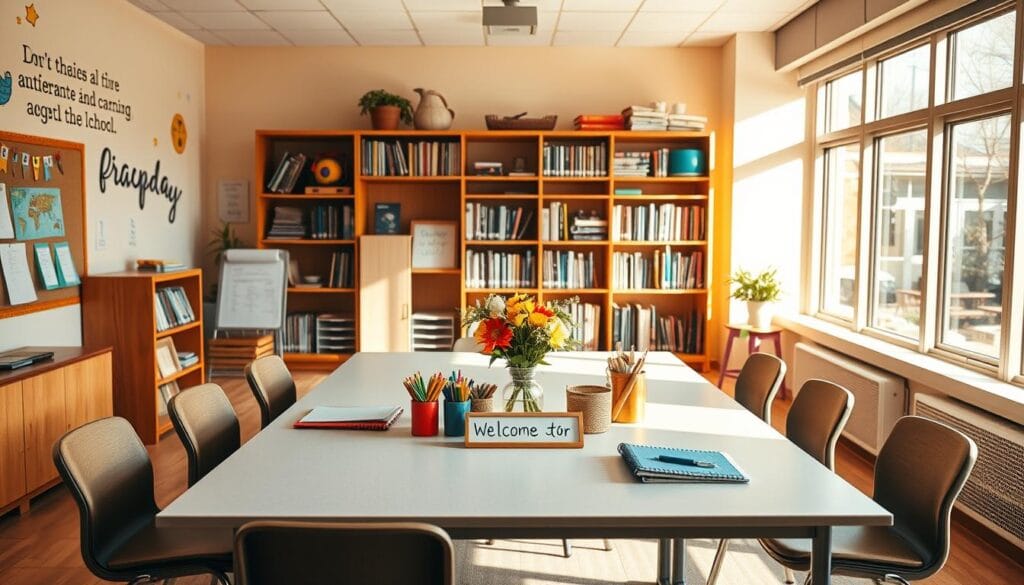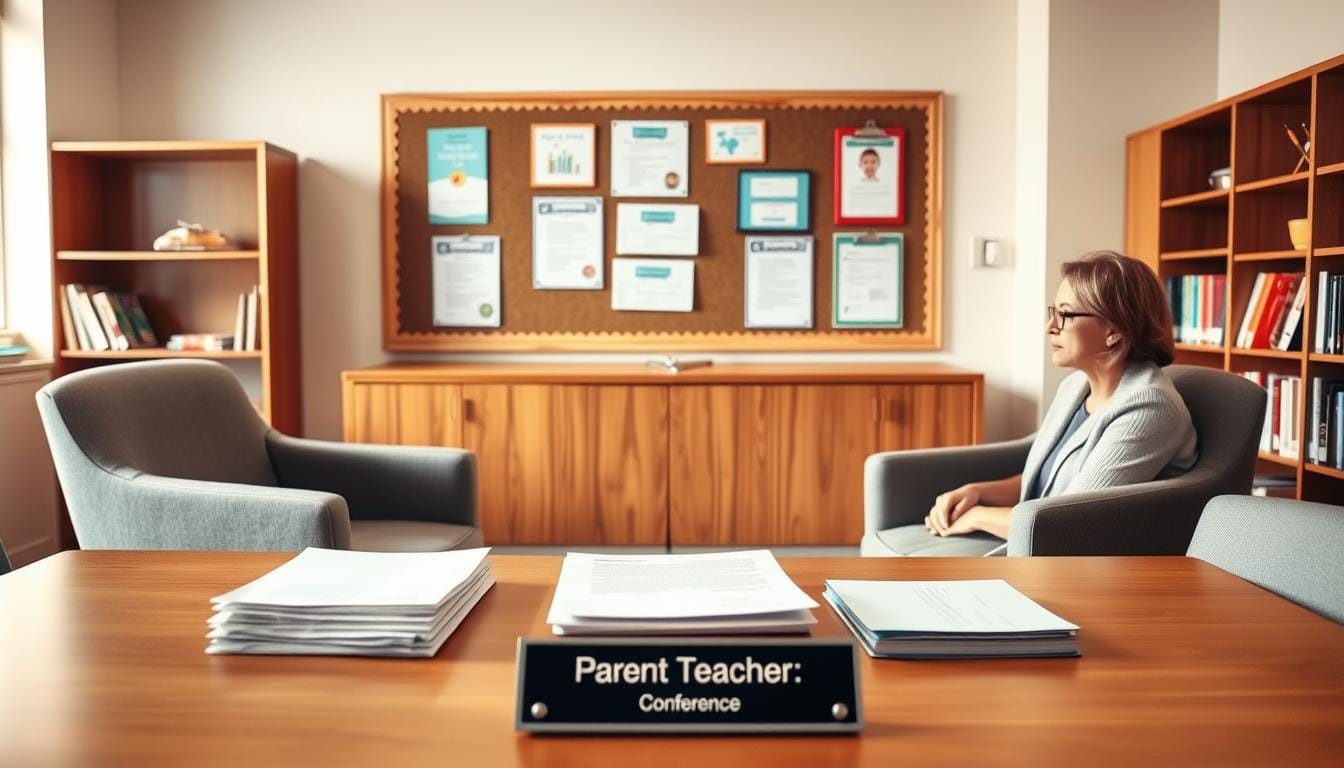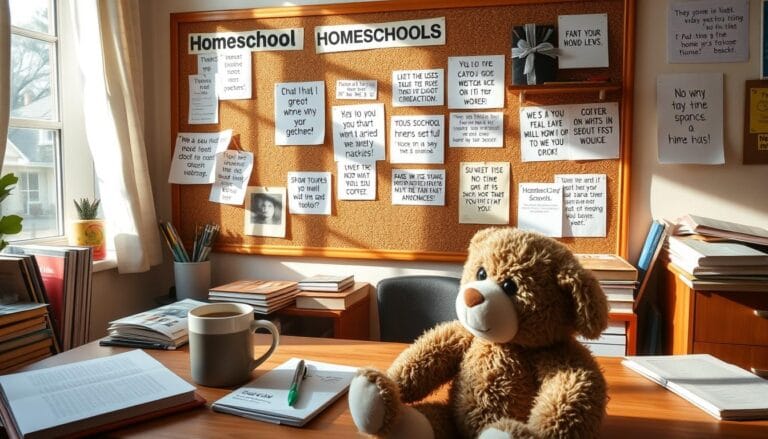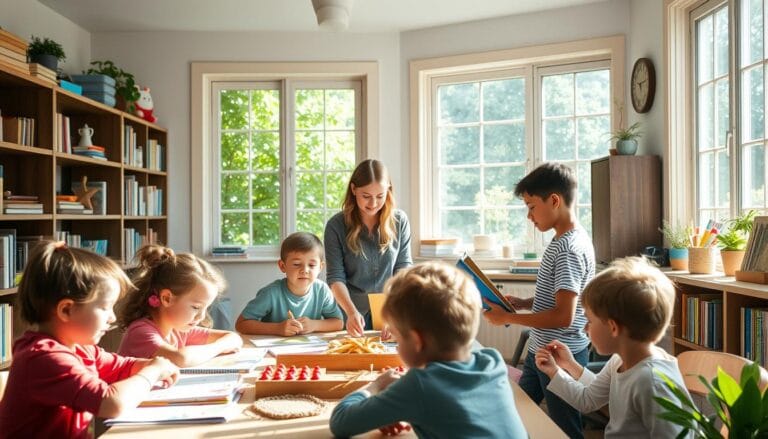Parent Teacher Conference Tips for Productive Meetings
Every parent dreams of helping their child reach their highest potential. Parent Teacher conferences are a key chance to connect home and school. They can turn simple tasks into powerful partnerships that greatly affect your child’s learning.
Attending a parent-teacher conference is more than just a meeting. It’s a chance to work together for your child’s growth. Studies show that good communication during these meetings can boost your child’s grades and interest in learning.
Many parents feel stressed or short on time during these talks. But, with the right steps, you can turn these chats into deep discussions. These discussions offer real insights into your child’s school life.
Knowing how to make the most of a parent teacher conference is key. By preparing well, asking the right questions, and staying open-minded, you help your child’s learning grow. This creates a supportive space for your child to thrive.
This guide will show you how to make your next parent teacher conference truly impactful. It will help your child succeed in school.
Table of Contents
Understanding the Importance of School-Parent Communication
Good communication between parents and teachers is key to a student’s success. Studies show that strong relationships between schools and parents can greatly improve learning outcomes. By talking openly, you can help your child reach their full potential in school.
Benefits of Strong Parent-Teacher Relationships
Having a strong partnership with your child’s teachers brings many benefits:
- Increased student motivation and engagement
- Better understanding of individual learning needs
- Early identification of potential academic challenges
- Enhanced support for student development
“When parents and teachers work together, students thrive.” – Educational Research Institute
Impact on Student Success
Research shows the power of school meetings and parental involvement. About 87% of successful students say their parents’ support helped them achieve. With regular communication, parents can make a big difference in their child’s school year.
Building Educational Partnerships
A school meeting is more than just a routine check-in. It’s a chance to work together for your child’s education. Teachers value these meetings, seeing them as crucial for understanding and planning.
By taking part in school meetings, you show your child that learning is a team effort. This can boost their motivation by 50% and even lower dropout rates by up to 30%.
Remember, your involvement matters more than you might realize.
Preparing Essential Documentation and Data
Getting ready for a parent teacher conference means organizing student progress documents well. You aim to show a detailed view of each student’s learning path and growth.
Begin by collecting key documents that clearly show student progress:
- Academic report cards
- Standardized test scores
- Classroom assignment samples
- Behavioral observation notes
- Individual learning assessments
Studies reveal that 85% of teachers using benchmark testing results see better parent understanding. When sharing student progress data, focus on examples that show growth and areas for betterment.
“Documentation is the bridge between classroom performance and parental understanding.”
Make folders for each student a few days before the conferences. These folders should have:
- A detailed summary of academic performance
- Work samples that show strengths
- Recommendations for improvement
- Learning goals
By carefully preparing documents, you’ll have a productive talk that helps parents support their child’s learning. Good documentation turns parent teacher conferences into key planning sessions for student success.
Creating an Effective Parent Teacher Conference Agenda
Preparing a strategic agenda for parent teacher conferences can change these meetings. They can become powerful chances for student growth. Good planning makes sure every minute is used well when talking about school performance and student growth.
Time Management Strategies
New teachers need to know that conferences need careful planning. Studies show that good preparation can make meetings 20% more effective. Here are some tips for managing time:
- Set specific times for each topic
- Have all materials ready to avoid delays
- Make a clear agenda with the most important topics first
Key Discussion Points
Teachers should aim for a balanced talk when discussing school performance. Research shows that 85% of parents like to focus on goals rather than problems.
- Student strengths and achievements
- Areas for improvement
- Specific learning goals
- Ways to work together
Setting Clear Objectives
The most successful conferences are those where both teacher and parent understand the shared goal: supporting student success.
By clearly showing learning standards and how grades are given, teachers can lower parent worries by about 60%. A structured plan should include:
- Setting clear student goals
- Creating plans for growth
- Planning for future meetings
Remember, a well-planned conference is your roadmap to meaningful educational collaboration.
Setting Up a Welcoming Conference Environment

Creating a warm and inviting atmosphere is key for good teacher-parent talks. The physical space sets the mood for these meetings. Studies show 60% of parents like casual seating for better chats.
Here are some tips for a welcoming space:
- Use circular or semi-circular chairs for open talks
- Get rid of big desks to avoid feeling apart
- Make sure the room is bright and comfy
- Show off student work and classroom wins to set a positive vibe
“The environment speaks before words are exchanged” – Educational Communication Expert
Body language and the room’s setup matter a lot in these talks. Over 80% of teachers suggest starting with something positive to keep things positive.
Visuals can make the meeting more engaging. Think about using:
- Student portfolios
- Performance graphs
- Highlights of their achievements
Tip: A well-thought-out space shows you care about the student’s education and getting parents involved.
Effective Communication Strategies for Teachers
Good parent-teacher talks start with strong communication skills. These skills turn updates into real talks. It takes skill, empathy, and a smart plan.
Good talks between teachers and parents help students learn better. Studies show that when teachers and parents talk well, students do better in school.
Active Listening Techniques
Listening well is key in parent meetings. Here are some tips:
- Maintain eye contact
- Use open body language
- Avoid interrupting parents
- Reflect back what you’ve heard
Using Positive Language
“Communication works for those who work at it.” – John Powell
When talking about how students are doing, be positive. Focus on:
- Highlighting student strengths
- Offering specific, actionable feedback
- Presenting challenges as opportunities for growth
Handling Difficult Conversations
Not every talk is easy. When talking about tough topics:
- Remain calm and professional
- Provide evidence-based observations
- Collaborate on potential solutions
- Demonstrate genuine care for student success
Remember, effective communication turns challenges into chances for students to grow.
Presenting Student Progress and Achievement Data

At parent teacher conferences, showing how students are doing is very important. Families often look at letter grades. But, there’s more to see in detailed assessment data.
To have a good talk, try these ways to share student achievement:
- Speak clearly and avoid hard-to-understand words
- Use graphs to show how students compare to others
- Give context about how students are growing and what they can do
“Data tells a story beyond just numbers – it reveals a student’s learning journey.”
The MAP Growth Family Report is a great example for showing student data. It explains complex stuff in simple terms by:
- Defining important terms like “achievement” and “growth”
- Showing how students do with easy-to-understand graphs
- Linking student performance to future tests
Your aim is to turn data into a story that helps parents see their child’s progress. Being open and clear is essential for working together in education.
Developing Action Plans for Student Success
Creating effective action plans is key for student growth and success. When parents and teachers work together, they make strong strategies. These strategies help students on their educational path. Goal setting is at the heart of this teamwork.
Setting Realistic Goals
Setting meaningful goals needs careful thought and input from parents and teachers. Your plan should have clear, reachable goals that push and inspire the student.
- Identify specific areas for improvement
- Create measurable and time-bound objectives
- Ensure goals are challenging yet attainable
Creating Support Strategies
Support strategies help bridge the gap between where students are now and where they want to be. Studies show that 85% of teachers believe good communication boosts learning. By creating specific support plans, you can meet each student’s needs.
- Identify additional learning resources
- Establish consistent home and school support
- Create personalized intervention plans
Establishing Timeline for Progress
A clear timeline helps track student progress and keeps everyone accountable. Research shows that parent-teacher meetings can raise student achievement by 30% when parents are involved. Break down big goals into smaller, easier steps.
“Progress is impossible without clear direction and consistent effort.”
By setting clear goals and making detailed action plans, you can help your student reach their full potential. This path leads to academic success.
Maintaining Post-Conference Communication
Keeping in touch after a parent teacher conference is key. It helps tackle learning challenges and supports students’ success. Good follow-up communication can lead to a 40% boost in parent involvement and engagement.
Having a solid communication plan is vital. It connects school and home. Here are some ways to keep the conversation going:
- Send weekly progress emails showing off student wins
- Make digital progress tracking sheets
- Plan short monthly calls
- Use online platforms for updates
“Communication works for those who work at it.” – John Powell
Being proactive can turn learning hurdles into chances for growth. Studies show 60% of schools see better parent satisfaction with regular updates. By keeping in touch, you show you care about the student’s education.
- Write down what needs to be done after the meeting
- Set clear communication goals
- Use different ways to talk to parents
- Always be ready to chat and help
Staying involved can raise student grades by 25%. Your effort in keeping communication open helps students succeed.
Conclusion
Parent teacher conferences are key moments where teachers and parents work together. They meet once or twice a year to talk about how students are doing. They discuss school progress, behavior, and what each student needs to learn.
Your role in school is very important for students. By talking openly during these meetings, you help connect home and school. This teamwork helps spot problems early and find ways to help students succeed.
Good parent teacher conferences do more than just share grades. They start a conversation that keeps going. When parents and teachers team up, students get a strong support system. This helps them grow both in school and as individuals.
Your involvement is crucial. Whether it’s about test scores, social skills, or learning goals, every meeting counts. By showing up and participating, you show how much you care. This helps your child do well in school and in life.








